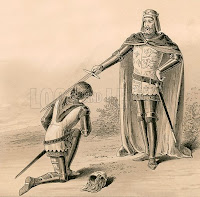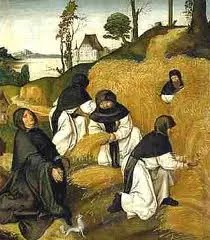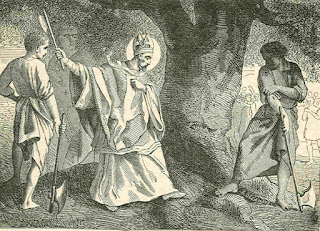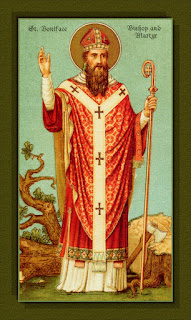Ramon, while still a young man and Seneschal to the King of Majorca, was very given to composing worthless songs and poems and to doing other licentious things. One night he was sitting beside his bed, about to compose and write in his vulgar tongue a song to a lady whom he loved with a foolish love; and as he began to write this song, he looked to his right and saw our Lord Jesus Christ on the Cross, as if suspended in mid-air.
He develops three goals: change his life completely and focus on God, convert everyone to Christianity, write the definitive book against the errors of unbelievers.
The first goal meant leaving his wife and two daughters and travel the world, never to return to his family.
He approached the second goal a little more methodically. In order to convert the Saracens, he needed to be able to talk to them. After giving up all his worldly goods and making several pilgrimages to shrines, he went back to Majorca and purchased himself a Muslim slave in order to learn Arabic from him. He spent the next nine years studying Latin and Arabic, and expanding his knowledge of both Christian and Muslim theology and philosophy.
The third goal would take the remainder of his life, as he wrote and re-wrote a series of books, producing a massive philosophical system that tries to cover so many ways to examine questions and determine proper answers that it includes features that are considered precursors to computation theory and an election theory 450 years before French mathematicians developed it.
His philosophical system was enormously elaborate, and did not catch on in his lifetime. In the generations following, however, people like Nicholas of Cusa adopted some of Llull's ideas. Others were not so supportive. In 1376, an inquisitor named Nicholas Eymerich obtained a papal bull to prohibit Llullian teaching. Llull's philosophy was forbidden in the Faculty of Theology in France.
One of Llull's great successes was part of his second goal: he believed that to spread the truth of Christianity required understanding the language of those you wanted to convert. He argued all over for the creation of schools of language to aid this goal. In 1311, the Council of Vienne at Llull's urging created chairs of Hebrew, Arabic, and Aramaic at the universities of Bologna, Oxford, Paris, and Salamanca.
As understanding as he seemed to want to be, he argued that Jews refusing to convert needed to be expelled from their countries.
He produced many written works, including his book about knighthood, summarized here.
There is a story that Llull was stoned to death sometime in 1315 or early 1316 in Tunis, where he spent several years trying to convert the Caliph and the people. Llull's tomb is in Majorca, at the Franciscan church in Palma.
Nicholas Eymerich is an interesting character, and since this blog has not looked closely at the job of an Inquisitor, I think it's time.




























